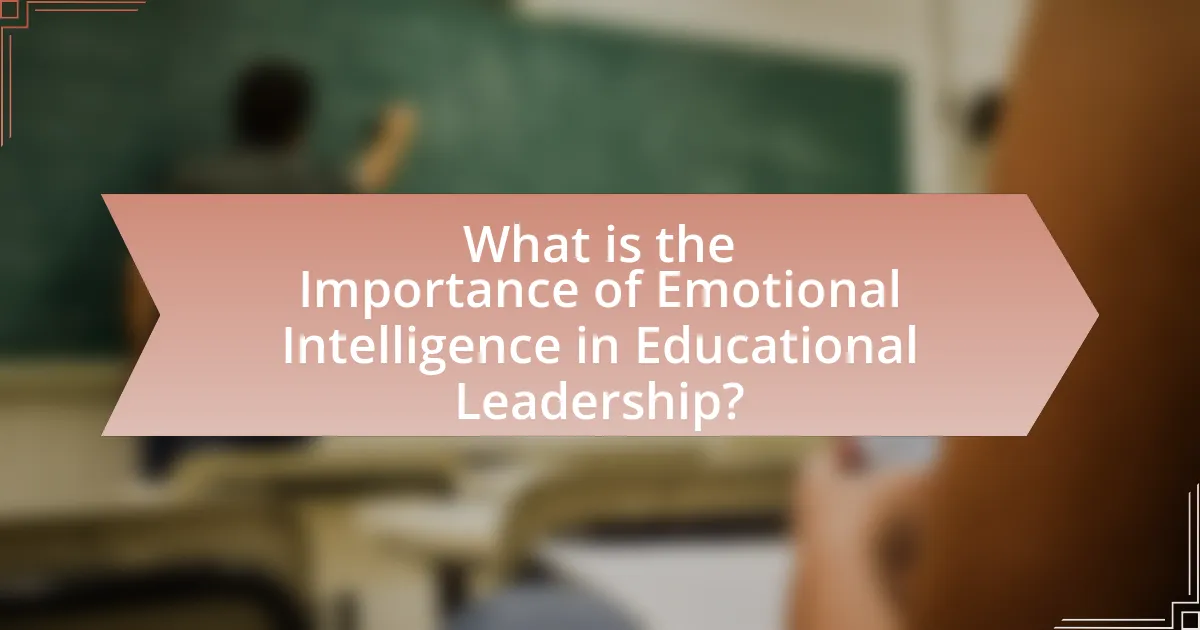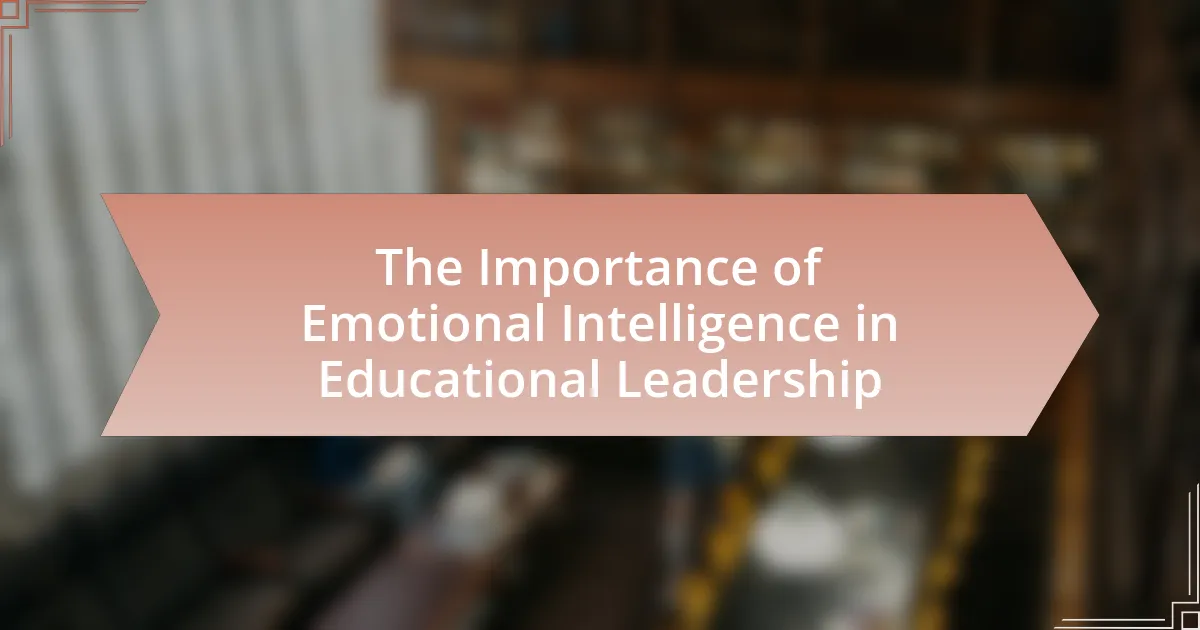Emotional intelligence is a critical component of effective educational leadership, significantly impacting the ability of leaders to understand and manage their own emotions and those of others. This article explores the importance of emotional intelligence in fostering positive school environments, enhancing communication, and building strong relationships among staff and students. Key components such as self-awareness, self-regulation, social awareness, and relationship management are examined, along with their influence on teacher satisfaction and student performance. Additionally, the article discusses strategies for developing emotional intelligence in educational settings, the role of professional development, and the implications for educational policy and reform.

What is the Importance of Emotional Intelligence in Educational Leadership?
Emotional intelligence is crucial in educational leadership as it enhances the ability of leaders to understand and manage their own emotions and those of others, fostering a positive school environment. Leaders with high emotional intelligence can effectively communicate, build strong relationships, and resolve conflicts, which are essential for creating a collaborative and supportive educational atmosphere. Research indicates that schools led by emotionally intelligent leaders experience improved teacher satisfaction and student performance, as these leaders are better equipped to motivate staff and engage students. For instance, a study published in the “Journal of Educational Psychology” found that emotional intelligence in school leaders correlates with higher levels of teacher retention and student achievement, demonstrating its significant impact on educational outcomes.
How does emotional intelligence influence educational leadership?
Emotional intelligence significantly influences educational leadership by enhancing leaders’ ability to understand and manage their own emotions and those of others. This capability fosters effective communication, builds strong relationships, and creates a positive school climate. Research indicates that leaders with high emotional intelligence are more adept at conflict resolution and can motivate staff and students, leading to improved academic outcomes. For instance, a study published in the “Journal of Educational Administration” found that principals with higher emotional intelligence reported better staff satisfaction and student performance, demonstrating the direct impact of emotional intelligence on educational leadership effectiveness.
What are the key components of emotional intelligence in this context?
The key components of emotional intelligence in the context of educational leadership are self-awareness, self-regulation, social awareness, and relationship management. Self-awareness allows leaders to recognize their emotions and understand how they affect their decision-making. Self-regulation enables leaders to manage their emotions and maintain control, fostering a positive environment. Social awareness involves the ability to empathize with others, understanding their emotional states, which is crucial for effective communication and support. Relationship management encompasses the skills needed to build and maintain healthy relationships, facilitating collaboration and conflict resolution. These components collectively enhance a leader’s ability to create a supportive and productive educational environment, as evidenced by studies showing that emotionally intelligent leaders positively impact teacher satisfaction and student outcomes.
How do these components manifest in educational leadership practices?
Emotional intelligence components manifest in educational leadership practices through enhanced communication, relationship building, and conflict resolution. Leaders with high emotional intelligence effectively recognize and manage their own emotions and those of others, fostering a positive school climate. For instance, research by Goleman (1995) highlights that emotionally intelligent leaders can create supportive environments that promote collaboration among staff and students, leading to improved academic outcomes. Additionally, leaders who demonstrate empathy and social skills are better equipped to address conflicts and motivate their teams, as evidenced by studies showing that schools led by emotionally intelligent administrators experience lower turnover rates and higher teacher satisfaction.
Why is emotional intelligence critical for effective leadership in education?
Emotional intelligence is critical for effective leadership in education because it enables leaders to understand and manage their own emotions while also recognizing and influencing the emotions of others. This skill fosters a positive school climate, enhances communication, and builds strong relationships among staff, students, and parents. Research indicates that leaders with high emotional intelligence can improve teacher satisfaction and student outcomes, as they are better equipped to handle conflicts, motivate their teams, and create an inclusive environment. For instance, a study published in the “Journal of Educational Psychology” found that emotionally intelligent leaders positively impact teacher retention and student achievement, demonstrating the tangible benefits of emotional intelligence in educational settings.
What impact does emotional intelligence have on teacher-student relationships?
Emotional intelligence significantly enhances teacher-student relationships by fostering better communication, understanding, and empathy. Teachers with high emotional intelligence can recognize and manage their own emotions while also being attuned to the emotional states of their students. This ability leads to a supportive classroom environment where students feel valued and understood, which is crucial for their academic and social development. Research indicates that emotionally intelligent teachers can positively influence student engagement and motivation, as they create a safe space for expression and learning. For instance, a study published in the “Journal of Educational Psychology” found that students taught by emotionally intelligent teachers reported higher levels of satisfaction and lower levels of anxiety, demonstrating the direct impact of emotional intelligence on the quality of teacher-student interactions.
How does emotional intelligence contribute to a positive school culture?
Emotional intelligence contributes to a positive school culture by fostering strong interpersonal relationships among students, teachers, and staff. When individuals possess high emotional intelligence, they are better equipped to understand and manage their own emotions, as well as empathize with others. This leads to improved communication, collaboration, and conflict resolution within the school environment. Research indicates that schools with emotionally intelligent leadership experience higher levels of student engagement and lower rates of bullying, as emotionally aware leaders create a supportive atmosphere that prioritizes emotional well-being. For instance, a study published in the Journal of Educational Psychology found that schools implementing emotional intelligence training saw a 20% increase in student satisfaction and a significant decrease in disciplinary issues, demonstrating the tangible benefits of emotional intelligence on school culture.
What challenges do educational leaders face without emotional intelligence?
Educational leaders without emotional intelligence face significant challenges in fostering a positive school environment and effectively managing staff and student relationships. These leaders struggle with communication, leading to misunderstandings and conflicts among staff, which can diminish morale and productivity. Additionally, they may find it difficult to empathize with students’ needs, resulting in a lack of support for those facing emotional or academic challenges. Research indicates that schools led by emotionally intelligent leaders experience higher levels of teacher satisfaction and student engagement, highlighting the critical role emotional intelligence plays in educational leadership effectiveness.
How can a lack of emotional intelligence affect decision-making?
A lack of emotional intelligence can significantly impair decision-making by hindering an individual’s ability to recognize and manage their own emotions and those of others. This deficiency often leads to poor interpersonal relationships, resulting in miscommunication and conflict, which can cloud judgment and lead to suboptimal choices. Research indicates that leaders with low emotional intelligence are more likely to make impulsive decisions without considering the emotional impact on their team, ultimately affecting organizational morale and effectiveness. For instance, a study published in the Journal of Educational Leadership found that educational leaders lacking emotional intelligence struggled to foster a collaborative environment, which is crucial for effective decision-making in schools.
What are the consequences of poor emotional intelligence on staff morale?
Poor emotional intelligence significantly lowers staff morale. When leaders lack emotional intelligence, they struggle to understand and manage their own emotions and those of their staff, leading to ineffective communication and conflict. This can result in increased stress levels among employees, decreased job satisfaction, and higher turnover rates. Research indicates that organizations with leaders who exhibit high emotional intelligence experience 20% higher employee engagement and productivity, highlighting the detrimental effects of poor emotional intelligence on staff morale.
How can educational leaders develop their emotional intelligence?
Educational leaders can develop their emotional intelligence by engaging in self-reflection, seeking feedback, and participating in professional development programs focused on emotional skills. Self-reflection allows leaders to understand their emotions and reactions, while feedback from peers and mentors provides insights into their interpersonal effectiveness. Professional development programs, such as workshops on emotional intelligence, have been shown to enhance leaders’ abilities to manage their emotions and understand the emotions of others, leading to improved leadership outcomes. Research indicates that leaders with higher emotional intelligence foster better relationships and create more positive school environments, ultimately benefiting student achievement.
What strategies can be implemented to enhance emotional intelligence in educational settings?
To enhance emotional intelligence in educational settings, strategies such as integrating social-emotional learning (SEL) curricula, providing professional development for educators, and fostering a supportive school climate can be implemented. Research indicates that SEL programs improve students’ emotional skills, leading to better academic performance and social interactions. For instance, a meta-analysis by Durlak et al. (2011) found that students participating in SEL programs showed an 11 percentile-point gain in academic achievement compared to those who did not. Additionally, training educators in emotional intelligence can equip them with the skills to model and teach these competencies effectively, creating an environment conducive to emotional growth.
What role does professional development play in building emotional intelligence?
Professional development plays a crucial role in building emotional intelligence by providing educators with the skills and knowledge necessary to understand and manage their own emotions and those of others. Through targeted training programs, educators learn techniques such as self-awareness, empathy, and effective communication, which are essential components of emotional intelligence. Research indicates that professional development initiatives that focus on social-emotional learning can lead to improved emotional competencies among educators, ultimately enhancing their leadership effectiveness and fostering a positive school climate. For instance, a study published in the Journal of Educational Psychology found that teachers who participated in emotional intelligence training reported higher levels of emotional regulation and interpersonal skills, which positively impacted their interactions with students and colleagues.
How can mentorship programs support emotional intelligence growth?
Mentorship programs can support emotional intelligence growth by providing structured guidance and feedback that enhances self-awareness and interpersonal skills. Through regular interactions with mentors, individuals can receive constructive criticism and encouragement, which fosters an understanding of their emotional responses and those of others. Research indicates that mentorship relationships can lead to improved emotional regulation and empathy, essential components of emotional intelligence. For instance, a study published in the Journal of Educational Psychology found that participants in mentorship programs reported higher levels of emotional awareness and better conflict resolution skills, demonstrating the effectiveness of mentorship in developing emotional intelligence.
What are the best practices for integrating emotional intelligence in educational leadership?
The best practices for integrating emotional intelligence in educational leadership include fostering self-awareness, promoting empathy, and encouraging open communication. Educational leaders should engage in regular self-reflection to understand their emotions and how these affect their decision-making and interactions with staff and students. Research indicates that leaders who demonstrate empathy can build stronger relationships, leading to a more positive school climate. Additionally, establishing channels for open communication allows for the expression of emotions and concerns, which can enhance collaboration and trust among team members. Implementing training programs focused on emotional intelligence can further equip educational leaders with the necessary skills to navigate complex interpersonal dynamics effectively.
How can leaders model emotional intelligence for their teams?
Leaders can model emotional intelligence for their teams by demonstrating self-awareness, empathy, and effective communication. By recognizing their own emotions and understanding how these affect their behavior, leaders set a standard for emotional regulation within the team. For instance, when leaders openly discuss their feelings during challenging situations, they encourage team members to express their emotions constructively. Additionally, leaders who actively listen and validate their team members’ feelings foster an environment of trust and support. Research indicates that emotionally intelligent leaders can enhance team performance and satisfaction, as seen in a study published in the Journal of Educational Psychology, which found that leaders who exhibit high emotional intelligence positively influence their team’s engagement and collaboration.
What tools and resources are available for fostering emotional intelligence in schools?
Tools and resources available for fostering emotional intelligence in schools include social-emotional learning (SEL) programs, teacher training workshops, and digital applications. SEL programs, such as the Collaborative for Academic, Social, and Emotional Learning (CASEL), provide structured curricula that enhance students’ emotional skills, leading to improved academic performance and better social interactions. Teacher training workshops, like those offered by the Yale Center for Emotional Intelligence, equip educators with strategies to model and teach emotional intelligence effectively. Additionally, digital applications, such as Mood Meter and ClassDojo, offer interactive platforms for students to identify and manage their emotions, promoting a culture of emotional awareness in the classroom. These resources collectively contribute to a supportive learning environment that prioritizes emotional development alongside academic achievement.
How can emotional intelligence lead to improved educational outcomes?
Emotional intelligence can lead to improved educational outcomes by enhancing students’ social skills, self-regulation, and academic performance. Research indicates that students with higher emotional intelligence demonstrate better interpersonal relationships, which fosters a positive learning environment. For instance, a study published in the Journal of Educational Psychology found that students with strong emotional intelligence scored significantly higher on standardized tests and exhibited lower levels of behavioral issues. This correlation suggests that emotional intelligence not only contributes to academic success but also promotes a supportive classroom atmosphere, ultimately leading to better educational outcomes.
What evidence supports the link between emotional intelligence and student success?
Research indicates a strong link between emotional intelligence and student success, as students with higher emotional intelligence tend to perform better academically and socially. A study by Brackett et al. (2019) published in the journal “Emotion” found that students with elevated emotional intelligence scores had improved academic performance, better classroom behavior, and enhanced relationships with peers and teachers. Additionally, a meta-analysis by Schutte et al. (2002) demonstrated that emotional intelligence is positively correlated with academic achievement across various educational settings. These findings collectively support the assertion that emotional intelligence plays a crucial role in fostering student success.
How does emotional intelligence influence educational policy and reform?
Emotional intelligence significantly influences educational policy and reform by promoting a more empathetic and responsive approach to leadership and decision-making. Leaders with high emotional intelligence can better understand the needs and emotions of students, teachers, and parents, leading to policies that foster a supportive learning environment. Research indicates that schools with emotionally intelligent leadership experience improved teacher retention rates and student outcomes, as these leaders are adept at conflict resolution and creating collaborative cultures. For instance, a study published in the “Journal of Educational Psychology” found that schools led by emotionally intelligent principals reported higher levels of teacher satisfaction and student engagement, demonstrating the direct impact of emotional intelligence on educational reform initiatives.
What practical tips can educational leaders use to enhance their emotional intelligence?
Educational leaders can enhance their emotional intelligence by practicing self-awareness, active listening, and empathy. Self-awareness involves regularly reflecting on one’s emotions and reactions, which can be achieved through journaling or seeking feedback from peers. Active listening requires leaders to fully engage with others, demonstrating understanding and validation of their feelings, which fosters trust and collaboration. Empathy can be developed by putting oneself in the shoes of students and staff, allowing leaders to respond more effectively to their needs. Research indicates that leaders with high emotional intelligence positively impact school climate and student outcomes, as they are better equipped to handle interpersonal relationships judiciously and empathetically.


